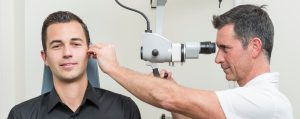PROGRESSIVE HEARING LOSS WITH AGE: IS IT INEVITABLE?

07 November 2019
As we get older, all our organs age, and the cells of the inner ear are no exception. It’s a totally normal process that affects everybody, although some people are affected by progressive hearing loss earlier and more quickly than others.
A gradual, normal process
The most commonly observed type of age-related hearing loss is “presbycusis,” which is marked by a slow, gradual development. High-pitched sounds become harder to perceive, which causes confusion in the understanding of words and consonants. Low-pitched sounds, meanwhile, are more audible.
Statistics prove the gradual aspect of presbycusis. In Canada, the average rate of hearing loss increases with age from “no more than 10% of people younger than age 50” to “65% among 70- to 79-year-olds.” * It’s therefore quite normal to be affected by hearing loss after a certain age, although other factors come into play when diagnosing it. Indeed, heredity, health status, and frequent exposure to loud noises, for example, can accelerate the aging of the inner ear and the effects of presbycusis.
Despite the importance of hearing on a daily basis and the large number of people affected by hearing loss, it often goes unnoticed and is insufficiently treated. Undiagnosed age-related deafness can lead to social isolation, reduced mobility, and feelings of insecurity – in short, to a deterioration in quality of life. But there’s no need to panic; you just need to take the right steps to recognize progressive hearing loss and live well with it.
The right steps
First, we recommend being attentive to your body and exercising vigilance when faced with changes in your hearing. If it becomes increasingly difficult to follow a conversation without having to ask the speaker to repeat themselves or if you find yourself increasing the volume on your TV more and more, it would be a good idea to consult a hearing care professional, especially if you’re over 60. They’ll be able to make a diagnosis and propose different solutions depending on the type and degree of hearing loss diagnosed.
We also recommend talking about this with those around you. This may seem awkward to some people, but you just have to remember that this is a normal phenomenon in order to get over your discomfort. Whether it’s with your family or friends, at work, or with the employees at a store or restaurant, letting people know about your hearing disorder helps prevent misunderstandings and tricky situations; it also lets you count on the understanding attitude of the people you’re talking to.
Once these steps are taken, you realize that, with a professional diagnosis, it’s quite possible to live well, and age well, with this little disability.
Solutions for aging well
Each case of hearing loss is unique, and only a hearing test can determine the right treatment for each person. We recommend not waiting too long before consulting a professional, since the cognitive areas used in the transmission of sounds tend to atrophy when they’re not stimulated for a long time. Early diagnosis and a personalized hearing aid helps you prevent the premature aging of the neurons in the cognitive areas associated with hearing.
Whether it’s an in-the-ear or a mini behind-the-ear hearing aid, these devices are now very easy to wear, even for the most hesitant people. In addition, the different levels of technology available let us offer more or less adjustable devices according to the degree of comfort and each person’s needs. Adjusting to these new tools may take a few weeks, but the benefits can be felt very quickly, and the feeling of rediscovering your world of sound is worth the effort.
Autres articles
Understanding Vestibular Balance Problems: Causes, Symptoms, and Treatment Options
Nos vies quotidiennes nécessitent un équilibre, mais parfois, des complications surviennent. Les problèmes d’équilibre vestibulaire entraînent des vertiges, des chutes…
SYMPTOMS OF A RUPTURED EARDRUM AND MOVEMENTS TO ADOPT
A ruptured eardrum is very common and may occur for many reasons. How do you recognize it and what should…
5 MAINTENANCE TIPS FOR YOUR HEARING AID
Caring for your hearing aid is essential for enjoying flawless, long-term sound quality. Indeed, the function and longevity of your…


